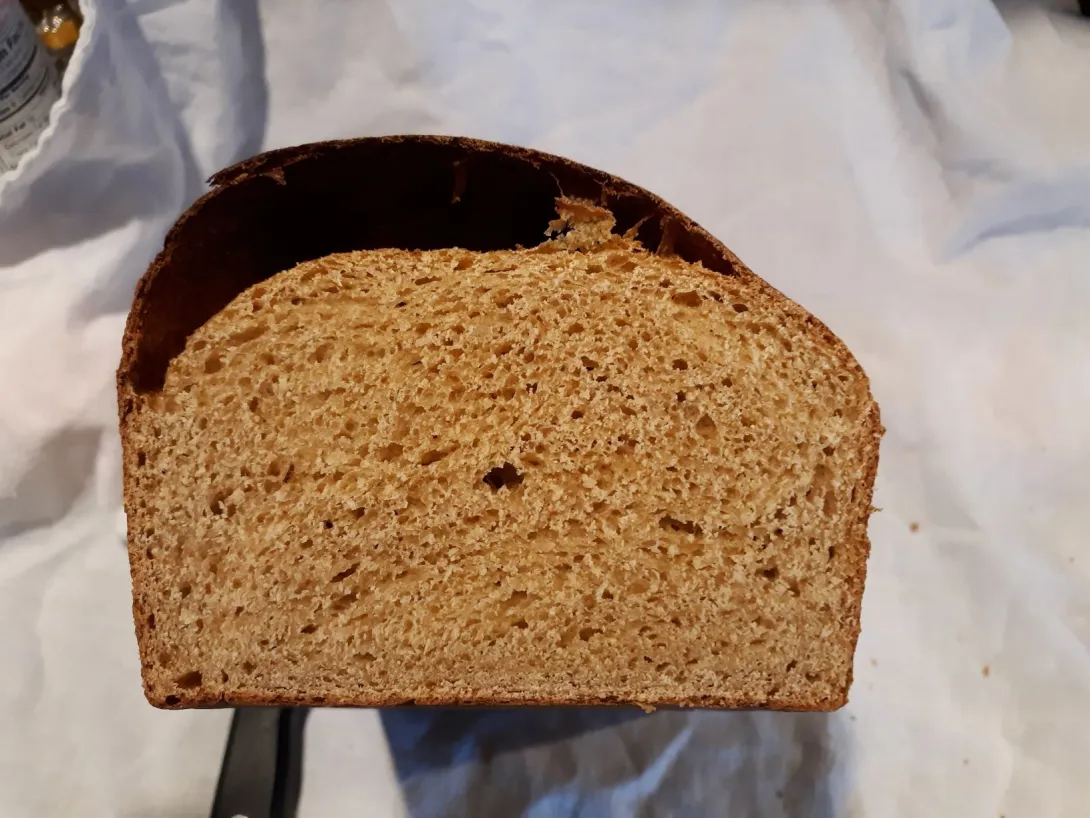
The image is from a loaf using Peter Reinhart's WGB 100% Whole Wheat Sandwich Bread recipe. This was my first time using the recipe and I am fairly new to baking 100% whole grain breads. The recipe was followed as written except that the salt content was modified to use 4.3 g of salt and 2.7 g of Lite Salt blend instead of 9 g of salt.
I thought the loaf had good crumb and flavor, but wondered about the cause of the flying crust. I suspect it was due to poor shaping as I saw the bubble forming during final proof. Could I have popped the bubble to prevent the crust separation? Any other suggestions will be appreciated.
Thanks!
2g less salt won't control the yeast as much as the 9g. Could very well have sped things up. And always a good idea to pop any large bubbles anyway.
Apart from the bakers cavern it looks inviting and tasty. A good sandwich loaf otherwise.
Thanks for the reply Abe.
I figured it was somewhat overproofed, but apart from the flying crust, the crumb seemed pretty uniform. In my research on salt content I found that unless salt is drastically reduced (or absent), the yeast is not significantly affected. Salt affects the development of gluten more than it affects yeast, but the crumb has good structure and holds up well in a sandwich. You can see some links in the following recent forum discussion:
Effect of salt in bread baking
I'll strive for better shaping of the dough and try popping, if needed.
However it will have some effect be it slowing down the ferment 'somewhat' (exactly to what extent can be discussed) and strengthening the gluten. Perhaps this can't just be pinned down to the salt percentage but less salt, a bit of over proofing on your part, not popping the bubbles and it's wholegrain to-boot perhaps it all helped towards the final result. It can be it's not down to one particular thing but an accumulation. Could you have helped by going easier on the ferment taking into account the lower % of salt making the dough less strong and/or speeding up the ferment? Could be! But from the looks of things, for whatever cause, it's a bit over proofed and popping bubbles is a good idea. Bet it's still tasty though.
P.s. perhaps another way to think about it is stronger gluten dough ferments slower than weaker gluten. Could be in a round about way how salt affects the fermentation.
I think your crumb is perfect for a sandwich loaf. I don't see any over-proofing, or signs of a collapsed crumb.
Your bubble is just an air bubble that needed popped before baking.
For an example of a collapsed crumb due to over-proofing, see: https://www.thefreshloaf.com/node/63422/gluten-free-sourdough-has-giant-air-pocket-top
Idaveindy,
I was just reading that a change in oven temperature, like opening an oven door, can collapse a loaf.
This was in the context of spraying an oven wall after the first two minutes to create steam.
Murph
that can happen if the dough is very delicate and the starch has not "set up" or gelatinized or whatever it's called.
It is more common to cakes where the batter has expanded a bit, but has not firmed up, and any vibration, like the oven door slamming, the kitchen door slamming, or kids running through the kitchen is enough to collapse it.
Opening the oven door just to look is said to reduce the air temp of a 350 degree F oven by 25 degrees F. And more so, when the oven is hotter.
I think using a dutch oven avoids that with bread. By the time you remove the lid, the bread structure is mostly set.
I am fairly certain it's a shaping artifact. Insufficient degassing coupled with enthusiastic rounding tends to create large bubbles under the skin.
Thank you to @idaveindy and @suave for the tips about loaf shaping.
I'm learning new techniques with whole grains and re-learning techniques from a 25-year hiatus from bread baking.
Happy New Year!